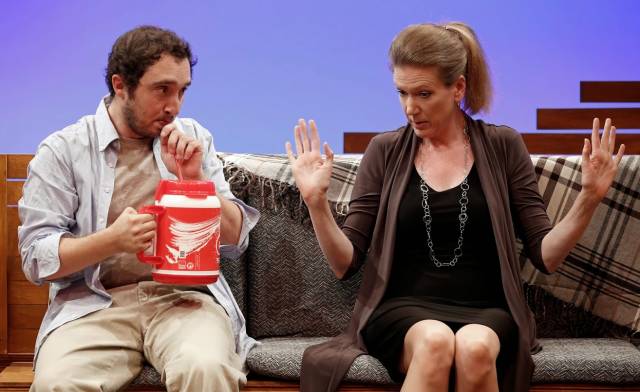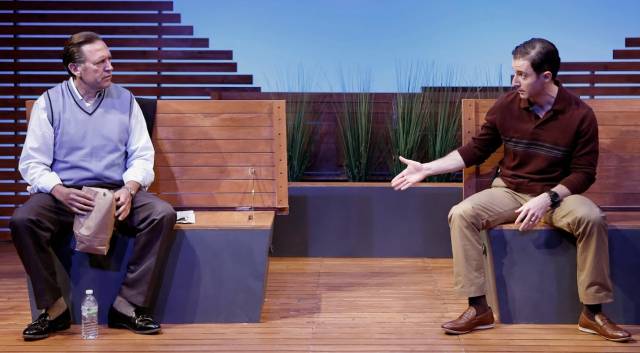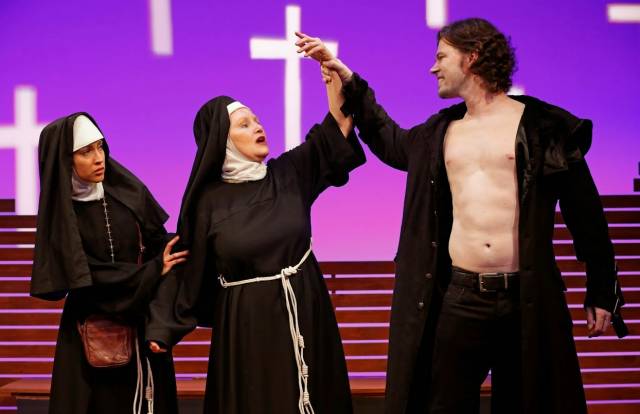

When watching several short plays in succession, as I had the pleasure to do last Friday at 59E59's annual installment of their Summer Shorts Series, it is an involuntary reflex as an audience member to try to sew together the shorts, to try to figure out what connects them as a larger piece of theater. The stage design is minimal, and three large wooden blocks transform seamlessly from couch, to park bench, to Church pew, with the aid of some throw pillows, fake bushes, and clever lighting design, amongst other subtle scene shifts. But such stage sleight of hand, if you will, fades quickly into the background, as powerful, disturbing, and thought provoking performances enter front and center.
Take Evelyn and her son Corey in Daniel Reitz's Napoleon in Exile, directed by Paul Schnee. It's wintertime, and Evelyn, played with exhausted grace by Henny Russell, has come home to find that her son has far exceeded his time limit on Minecraft, the online gaming universe, and has once again neglected his chores. He launches into a rant on his progress in the game and why he couldn't stop, which I am hilariously familiar with thanks to my frequent care of a loquacious eleven year old with a similar fondness for the game. But wait, Evelyn is past middle age, and Corey isn't in grade school, he's twenty-five. And something else isn't quite right. Evelyn is weary, but tenderly practiced in her communication with Corey (played by Will Dagger): "I feel...", "I worry..." Corey is far less tender, and when he pushes her buttons again and again ("Did you take your Lexapro?"), it seems the only explanation for her calm responses is that she's so very used to this. Corey has autism, and though he's charming, funny, and intelligent, it's very hard for him to hold down a job, even at a fast food place, and so he's perfectly content playing video games on his mom's couch, with a mom who unconditionally loves and understands him.
And then there's the real catch: Evelyn has been diagnosed with cancer, and now they must carefully contemplate a world in which Corey has to get by on his own. It is heartbreaking to see the way the two interact, two people who know and love each other so well, in their own ways, and the way that director Paul Schnee brings them together in the end is poignant and beautiful.

If we must, at this junction, ascertain a pattern, it seems to me that Summer Shorts Series B is about transforming safe, ubiquitous, ordinary spaces such as the home and the park, and supercharging, or, dare I say, perverting them. So when the lights go up on Neil Labute's The Mulberry Bush, and we see a man enjoying lunch on a park bench, the audience is already uneasy about what might unfold. Just as Napoleon started out innocently enough, a young man playing video games, so, too, The Mulberry Bush, as a man strolls on and strikes up a friendly and innocuous conversation. That happens at parks, right? But quickly things seem strange, as severe looking Kip, portrayed by J.J. Kandel, begins asking questions that are too personal. (Do you walk up to a businessman at lunch and ask him if he wanted to have children?) When Bill, played by Victor Slezak, our casual luncher, offers his chips as a gesture of friendship, Kip aggressively reaching his hand into Bill's bag of Lay's seems like a sign of some violation to come. Though the men speak through clenched teeth, in glancing euphemisms, it becomes clear that Kip's wife and young son have been stopping by Bill's usual lunch spot to chat. This may seem innocent enough, but Kip's son has been talking at home, and Kip, being the wound up authoritarian we sense him to be under his weakening facade of good-guy restraint, has done some digging on Bill, and discovered that he has had some unsavory interactions with young children in the past. The play dwells beautifully in ambiguity. Can a child molester change his ways? Does Kip, nonetheless, have a right to threaten him in a public place, where they both have a right to be? A final image of a suit-clad, broken Bill, crying alone to the cheery sounds of summer park frivolity, certainly leaves one less certain than they may have started out.

The final play, Doubtless, by Albert Innaurato, is a lot harder to fold into the group, and I'll preface my attempt by saying that at least three people walked out. It takes as its locale a church, but one which makes no bones about being a little off. Neon crosses adorn the back wall like some blasphemous music video set, and electronic music blares from behind a door to the side. Two nuns appear, and one, referred to as "Sister," played somewhat shakily by Tasha Guevara, is much younger than her white-haired counterpart, called "Mother." But don't let the nicknames and habits fool you; thirty seconds on stage, and they're making out and grabbing ass. The plot loosely centers around the fact that these nuns want to eschew their habits (in both senses of the word) and marry, but before they can do so they need Brother and Father to show up with cash and car keys to ease their escape. At surface value, it's a touching and sentimental conceit, about how their physical love can be as redeeming as their love for a higher being. But wait: Brother and Father haven't shown up because they're too busy looking for a sausage big enough to... ahem, "service", Supreme Court Justice Antonin Scalia at their Opus Dei orgy. And Mother Superior, played bawdily by Brenda Currin, is a racist, foul-mouthed, werewolf, who ends up going head to head with Jesus, who turns out to be a megalomaniac, pansexual vampire. To say that this play defies conventions would be an oversimplification of (a) conventions, and (b) what it means to defy them. Certainly not for the weak stomach, Innaurato's mere ability to offend pretty much everyone I could imagine is certainly commendable.
As a rather general argument, I think most people would agree that good writing makes us believe that the characters live on beyond what we see. And so much of these plays happens beyond the confines of the stage, in conflicts with people who never appear, and, shocker, don't exist. Through the magic of careful writing, genuine acting, and carefully choreographed direction, I worried about whether or not Corey's dad might take him in, how his step mother might treat him. I felt concern about Kip's wife, and why she might be striking up conversations with men in the park. And yes, call me crazy, but I would have liked, for just a second, to peep through the keyhole into the salacious Opus Dei "festivities." Summer might be great for turning your brain off and checking out, but those involved with Summer Series B aren't going in for that. For those left sluggish by the August humidity, it's time for that mid summer brain-jog, and 59E59 is a great place to start.
Summer Shorts continues through August 30 with two alternating programs. Series A includes performances of The Sky and the Limit by Roger Hedden, Riverbed by Eric Lane, and Sec. 310, Row D, Seats 5 and 6, by Warren Leight. (Read our review of Series A here.) For more information, head to www.summershortsfestival.com
Series A and B of Summer Shorts 2014 will run at 59E59 Theater from July 18-August 30.